 Peter Wawerzinek (Bild: Johannes Puch)
Peter Wawerzinek (Bild: Johannes Puch)
Peter Wawerzinek (G)
Peter Wawerzinek’s “Rabenliebe” [raven love] opened the third and final day of readings at the FGLL 2010. The author, who grew up in the GDR, was proposed by Meike Feßmann. The author dedicated his reading to the sick Hannelore Kain.
Author portrait
Camera: Steffen Sebastian Music: Lukas Rauchstein
Reading
Discussion
Memories of a GDR orphanage
“I thought that if I give myself away in writing, I will escape the vicious circle of memory. While writing, I penetrated remembering more deeply than I would have liked to” deems the first-person narrator in “Rabenliebe”, citing Eichendorff. While writing, the “winter child” approaches his first memories, “the day when the snow fell”, and the puerile abandonment as an orphan in a GDR orphanage. The text is interfused with newspaper clippings and notes of parental violence.
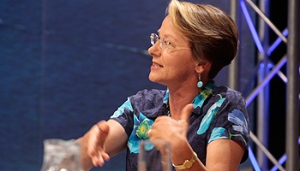 Hildegard Keller (Bild: Johannes Puch)
Hildegard Keller (Bild: Johannes Puch)
Keller: “Full of fervour and heartbeat”
The text “gained incredibly much” by being read out, said Hildegard Elisabeth Keller, although it “didn’t even need it”. Keller: “By no means lacking in nuances”, Wawerzinek’s prose is full of “fervour and heartbeat”, it could be called a “musical score” – only the “phonetic excursion at the end” is not quite clear.
However, this part could be understood as a search for words and for language in the “ice-cold world of the child”, the juror then added, putting her criticism into perspective.
Winkels: “Crude, hard form makes this text intense”
“Here, the absence of father and mother is remembered”, juror Hubert Winkels explained, which is presented in the text as a linguistic process: “Its crude, hard form makes this text intense”, said Winkels, the problem is the heterogeneous means it employs.
Eichendorffian euphony and rhythm is always mixed in with “plain text”, which is why Winkels asked: “Should one link so many heterogeneous moments with each other in this way?”
Fleischanderl suspects kitsch
Karin Fleischanderl positioned Wawerzinek’s text under “suspicion of kitsch”, where yesterday Josef Kleindienst was placed under “suspicion of pornography”. Although the text does not “completely fall into the trap” of its own images (“snow, crow, fields”), it does only just escape kitsch.
“In its favour”, it should be said that, although it does not add anything new to the ongoing boom of stories of traumatic childhood experiences, it does “mix up all the elements very well”. Another point of criticism: the brutality of what happened is here “cancelled out aesthetically”.
Sulzer: “You can tell the text has maturity”
Alain Claude Sulzer welcomed the fact that the author is older, and you can tell that he has “maturity and a trove of experience”. The text “touched” him “deeply”, and the breaks in the text that Fleischanderl complained about did not bother him at all. Here, the literature works its way back to a terrible childhood, in a “very soothing”, way, according to Sulzer.
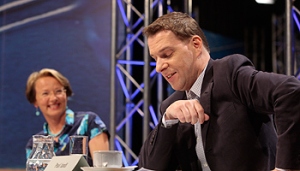 Paul Jandl (Bild: Johannes Puch)
Paul Jandl (Bild: Johannes Puch)
Jandl: “Very successful childhood identity”
“The text starts off with Eichendorff’s Winter Night quote, with the aim of liberating itself from it”, Paul Jandl believes. Although the text starts off somewhat heavily, it does illustrate very well that developing a biography also means developing linguistically. In this context, Jandl remembered the author Hans Josef Ortheil. Wawerzinek’s dense description of the childhood identity was “very successful”.
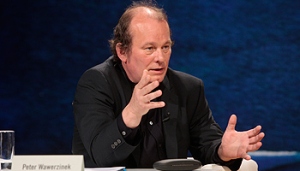 Peter Wawerzinek (Bild: Johannes Puch)
Peter Wawerzinek (Bild: Johannes Puch)
Feßmann: “A little heart stage”
Meike Feßmann felt she had to do something about the ”petty objections” of her colleagues and joined the discussion explaining leitmotivs (“snow, fog, crows, doors”) and the “fatal love“ of a child for its “uncaring [raven] mother”, “that wants to become part of society”.
The child in Wawerzinek’s text is “never put on display”, or exposed, said Feßmann: “The narrator is completely honest with the reader, he gives the child an imagination.” All this is “linguistically rich and multi-layered”, while many different types of texts are being integrated, so that the juror’s verdict was: “a little heart stage”.
“I might write funny books one day”
After a great deal of toing and froing from the jury, the author finally took the floor and explained: “Allow me to say something please: it wasn’t easy to write this, to get close to my own biography and it took me one decade – but at some point you have to come to the end. I might write funny books one day.”
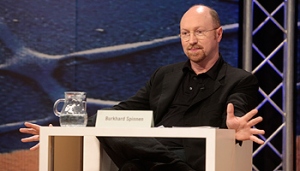 Burkhard Spinnen (Bild: Johannes Puch)
Burkhard Spinnen (Bild: Johannes Puch)
Spinnen withdrew his contribution
After a long discussion of the possibilities and impossibilities of nearing one’s own biography and much toing and froing about the newspaper clippings that Wawerzinek built into the text of abused children, Burkhard Spinnen finally withdrew his contribution in the “hope” that as a writer he could also someday approach the “implicitness of the aesthetic”.
Barbara Johanna Frank
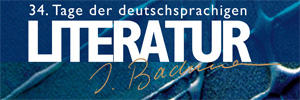 TDDl 2010
TDDl 2010